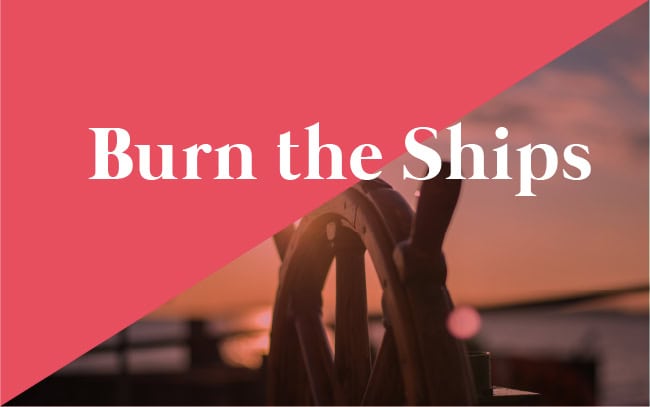
by Kerri MacFarlane | Oct 16, 2020 | Blog, Early Sobriety, Helpful Tips, The first Year
In the year 1519, Hernán Cortés, a Spanish conquistador, arrived in the New World with six hundred men and, upon arrival, ordered his men to, ‘burn the ships’. ?⛵️ His logic behind this wasn’t to go down in the history books as the conquistador loco that ordered his men to destroy his ships. Nope. It was to send a message to his men, a loud and clear message…
…there is no turning back…his men would have to conquer, or die.
Two years later, in 1521, Hernán Cortés conquered the Aztec empire. HIs ‘burn the ships’ strategy worked! Although, guys! His men didn’t even really burn the ships, they sunk them! ?? And that fun fact, my friends, wraps up our history lesson.
But there is a life lesson in this story that I do want to talk about. The story about Hernán Cortés, in its simplest form, is really just about commitment.
Retreat is easy when you let yourself have the option.
On February 15th, 2019, while attending my very first Recovery Elevator event, Nashville LIVE…I hit 100 days sober. I can remember how excited I was when I did the math and realized I would be there on that day. But I was also terrified! Flying across the country, alone, to go meet members from my online recovery community, that I only knew from Facebook…was stepping way outside of my comfort zone. It was scary, I was so nervous I almost canceled the trip. Strangers scared me. People scared me.
At that point in my sobriety, counting days was very important to me. There were days, even weeks, in the beginning, when counting those days was all I could focus on. But that got me to day 100. The first day 100 in many, many years.
Knowing myself, and finally being honest with myself, I knew that I would have to do something more than count days and read quit lit if I was going to make it another 100 days. I needed more accountability and I was going to have to get uncomfortable. So I bought that plane ticket to Nashville. And I secretly made plans to publicly share my milestone of 100 days sober on social media.
It’s not just a coincidence that my 100th day fell 100 days after my (last?) rock bottom moment. I’m not going to go into anymore of my story right now, if you’re curious you can listen to my interview – Recovery Elevator Episode 255.
When it came time to press “Post” I was a mess of sweaty, shakey, nerves. Even admitting to the people that knew, from personal experience, of my drinking problem was hard. I was embarrassed, filled with shame and guilt. My anxiety was still at an all time high, almost paralyzing at times.
There is this stigma associated with addiction, and too often it keeps people from admitting they have a problem or from seeking help. The word ‘alcoholic’ brings up images of a person living under a bridge, drinking from a brown paper bag.
I often felt damaged, defective, less than. I knew that in order for me to move forward in life, to break the cycle I had been on, that I would have to do something drastic.
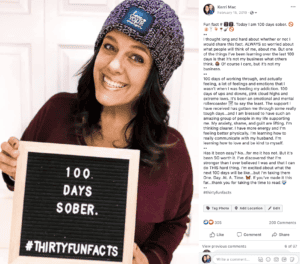
This public post on Facebook was my ‘drastic’. ??
I have never regretted posting it. As I started getting the notifications from comments and likes I was afraid to go read them. When I finally did I wanted to cry. Happy tears. ? Grateful tears. I was overwhelmed and speechless by all the positive, encouraging, supportive and ‘I can relate’ messages that I got. I was shown nothing but love.
This single scary ‘burn the ships’ post 100 days in busted down the door and has made it easy for me to continue to share my journey. Using my story and my voice helps keep me in check, and it helps others know that they are not alone.
Fast forward to today…In the few days before sitting down to get these words out I was doing a lot of thinking about my 100 day post, trying to remember the way I was feeling, what emotions I was experiencing. What quickly came to mind was how scared I was. Putting yourself out there like this, being vulnerable like this, is scary. And once it’s out there…once that ship has been burned…it can’t be unburned! But that’s the point, right? I knew I had no other choice, I had to take action. If I didn’t, nothing would change. Even though I really wanted to get sober and live a life without alcohol, I was too scared to leave the comfortable and familiar. Burning the ships gave me the courage, strength, and the push, to step into a new life.
Have you burned your ships? Or do you always give yourself a way out?
It doesn’t have to be a public blast on social media like I did. That was a level 5 on the Burnometer! ?
There are different levels of burning the ships. Start with level 1, work your way up! They all will help establish another layer of accountability for you.
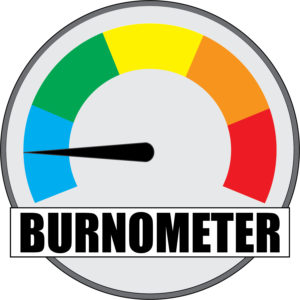
Level 1: Someone you don’t know well. This could be a store clerk, a barista, a friend from book club, but not a stranger.
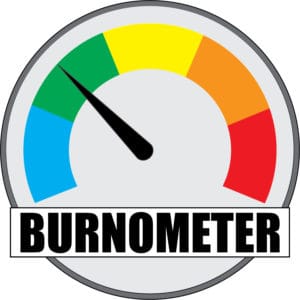 Level 2: Someone you consider a friend, or who you have regular monthly interaction with. This is an acquaintance from the gym, a neighbor, restaurant employee.
Level 2: Someone you consider a friend, or who you have regular monthly interaction with. This is an acquaintance from the gym, a neighbor, restaurant employee.
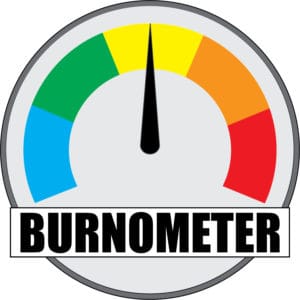 Level 3: This is someone you interact with on a weekly basis. Co-worker, good friend, running partner, or hiking friend.
Level 3: This is someone you interact with on a weekly basis. Co-worker, good friend, running partner, or hiking friend.
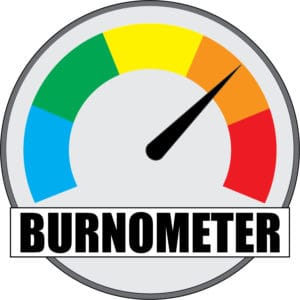 Level 4: Meeting with a close group of friends, family, spouse, in person conversation. Immediate family.
Level 4: Meeting with a close group of friends, family, spouse, in person conversation. Immediate family.
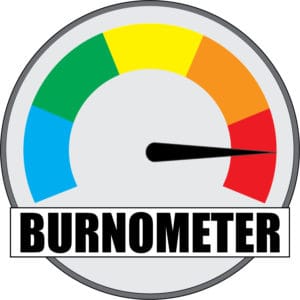 Level 5: FB Live, Podcast, Social media post, family meeting, airplane with banner in the sky.
Level 5: FB Live, Podcast, Social media post, family meeting, airplane with banner in the sky.
I challenge you to pick a level above, find someone that fits the description…and burn baby burn. ?
Please come back and share your experience with me!
Until next time, be well.
KMac ??
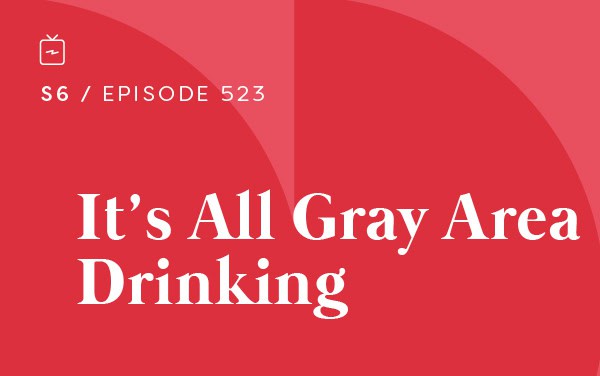
by Kris Oyen | Feb 24, 2025 | Podcast
Podcast: Play in new window | Download
Subscribe to the Recovery Elevator Podcast Apple Podcasts | | More
Today we have Robbie. He is 43 and lives in Moses Lake, WA. He took his last drink on August 15th, 2024
Sponsors for this episode include:
Better Help – 10% off of your first month
3,649 days ago, or 1 day shy of ten years, the first episode of the Recovery Elevator podcast dropped. Paul remembers the date well because for three months after the first episode released, he kept thinking “oh my God, what have I done?”. Burning the ships in podcast format gave Paul a lot of anxiety, but here we are, 523 weeks later and thank you listeners, for keeping the show alive.
30 Best Sobriety Podcasts
[04:13] Thoughts from Paul:
Paul shares the definition and his thoughts around the term gray area drinking. The definition states that it is the space between end-stage drinking and every now and again drinking. Gray area drinking could also be classified as someone who can stop drinking without medical detox or can stop on their own before someone stages an intervention.
Paul believes it’s all gray area drinking. Be it one beer a month or 10 beers a night. One common thread he hears on this podcast is “and then xyz happened”. It’s these major life events that can ramp up the drinking and everyone has life happen to them.
[07:10] Paul introduces Robbie:
Robbie is 43 years old and lives in Moses Lake, WA. He currently works at a chemical plant in the semiconductor industry. He has five children in the age range of eight months to 14. They enjoy spending time outdoors and at the lake near their home. Robbie is a big sports fan and played sports often while growing up.
Robbie took his first drink when he was in college in his 20s. He didn’t drink much until he lost his dad in 2013. Without knowing how to process his grief and having young children, Robbie learned that drinking helped him be numb and he started drinking four or five days a week. At the time, Robbie was working as a corrections officer, which was a very stressful job that contributed to his drinking as well.
In 2018 Robbie’s marriage ended. This was the first time he had been away from his children. He moved two hours away from them to stay at his mom’s house. After his second DUI in two weeks, the judge imposed alcohol monitoring for Robbie. This helped him stay sober for a year but only because he had to be.
Thinking he could now moderate, Robbie started drinking soon after no longer having the monitoring device. He says he wasn’t having a good time, and he was just using it to numb out from multiple traumas.
In February 2024 Robbie reached a breaking point and reach out to his brother-in-law who helped him find a treatment center in Utah. Robbie was there for 35 days and felt like he had made a lot of progress. He learned a lot about himself and started doing counseling. Robbie finally got some help dealing with some big traumas throughout his life. He says he feels like he used alcohol to punish himself thinking he deserved to be miserable.
After a brief relapse, Robbie says he woke up on August 15th and just knew it was over, and he had to stop drinking for good. He decided to try naltrexone which he first learned about in rehab. He took it for the first month and says he still has no desire to drink. Robbie goes to AA meetings, listens to podcasts and audiobooks, and is a member of Café RE. Robbie stays accountable with his family and friends at work. People have noticed a positive change in him.
In the past Robbie quit drinking because he was forced to, or for other people. He said on August 15th; he was doing it for himself. He says sobriety is the greatest gift to himself and his kids.
Robbie’s parting piece of guidance: If you’re asking yourself if you drink too much or if it’s becoming a problem, it already is. Listen to your gut. Believe in yourself that you can quit.
Recovery Elevator
You took the elevator down; you got to take the stairs back up.
We can do this.
Café RE
RE merch
Recovery Elevator YouTube
Sobriety Tracker iTunes
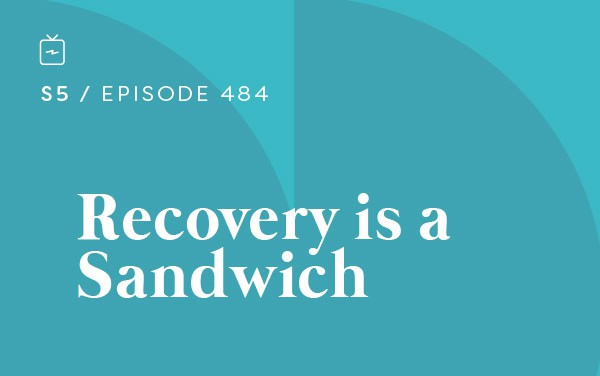
by Kris Oyen | May 27, 2024 | Podcast
Podcast: Play in new window | Download
Subscribe to the Recovery Elevator Podcast Apple Podcasts | | More
Episode 484 – Recovery is a Sandwich
Today we have Brian. He is 59 from Eastern Iowa. He took his last drink on May 23rd, 2023.
Recovery Elevator is going to Vietnam January 9th-20th, 2025. Registration for our newest alcohol-free travel trip opens July 1st and we’ve got room for 25 passengers. Who’s up for seeing the world with a group of travelers who have ditched the booze?
Better Help: www.betterhelp.com/elevator – 10% off your first month. #sponsored
[02:24] Thoughts from Kris:
Kris’ topic today is one of the foundational themes in recovery which is telling our story or burning the ships as we refer to it at Recovery Elevator.
Burning the Ships refers to when Hernan Cortez sailed across the ocean and ordered his men to burn their ships when they landed. There was no turning back, no retreat. When we share our story, we can no longer hide from it and are faced to move forward with others having knowledge of our journey.
This isn’t a black and white situation so it will be different for everyone, and we each have to do what is right for us. Kris shares the different levels of burning the ships and his experiences with them. He feels that the positives outweigh the negatives. When people hear our stories, not just the stats, it changes their perception. Hearing our stories in others’, helps us know we are not alone, and we never know the impact that sharing our stories may have on others.
Think of the moments that have inspired you. What is your version of that? Let Kris know what you think. How has burning the ships played out for you? Email kris@recoveryelevator.com to share your thoughts.
Athletic Greens: https://www.athleticgreens.com/recovery
[10:48] Kris introduces Brian:
Upon the release of this episode, Brian has just celebrated one year of sobriety!
He is married, together they have five adult children and seven grandchildren. Brian is active and enjoys many outdoor activities, home projects, travelling and reading.
Brian grew up on a farm and recalls it was common for people to have drinks after a long day of work. He says he and his friends would sneak beer out of curiosity. When he was in his teens, he and his friends would drive around the gravel roads with a cooler of beer. After graduating high school, Brian joined the military, which was a tradition in his family. He was enlisted for two years and lived the “work hard, play hard” life that is common in that environment.
Shortly after discharge from the Army, Brian got a DUI. He did not feel this was a red flag to stop drinking, just needed to pay the fine and move on. After graduating college, he got his first job in management and married his first wife. They bought land and started a family together. Brian says drinking was mostly social on the weekends and at the local tavern after work.
Brian and his wife got a divorce after 15 years married. Soon after, Brian began suffering from extreme anxiety and panic attacks. He tried medication and meditation to deal with it, but it was still intense.
A few years later, Brian started dating his current wife. They were very social and frequently drank, but she was not a heavy drinker. Brian began to find himself waking up with anxiety and would often change his work hours to accommodate his drinking or recovery from the night before.
In December of 2020 Brian discovered his sister had recently become sober. He feels this really led him to examine his drinking. Upon arriving home from that visit, he started reading a lot and listening to podcasts. He began attending more group chats with Café RE and connecting with other folks in recovery. Brian says his sister taught him a lot of mindfulness exercises which he has found very helpful.
Brian’s parting piece of guidance for those considering sobriety: just dig in and try it.
Café RE – promo code OPPORTUNITY waives set up fee.
RE merch
Instagram
Recovery Elevator YouTube
Sobriety Tracker iTunes
Recovery Elevator
I love you guys.
Go big because eventually we’ll all go home.
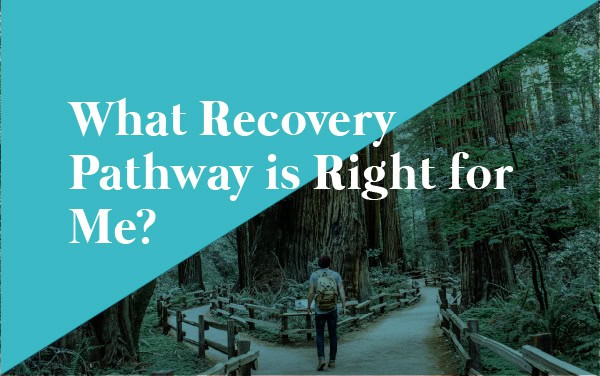
by Kerri MacFarlane | Jul 11, 2023 | Alcohol Free, Blog, Early Sobriety, Helpful Tips
In our Dry January course, REstore, Paul teaches a class covering the different recovery modalities. The good news is that In 2023, there are more ways to ditch the booze than ever before. Even just 10 years ago recovery took place in church basements with bad coffee and shitty donuts, but today the landscape is much different.
**Side note, Paul still goes to an AA meeting, in a church basement with bad coffee. He’s not dawging that way of recovery, he loves his Tuesday night AA meeting, but there are so many more methods, programs, techniques…you name it…available today.
So which pathway is right for you?
A couple caveats before we begin.
Caveat 1. If you are READY then ANY pathway is going to work for you. If you’re truly sick and tired of being sick and tired, then any of these programs will work. In addition, you HAVE to give them a solid try.
Caveat 2 – There is no right or wrong way to quit drinking. We’re going to give some recommendations, but it’s up to you to figure out what works best for you.
When building your recovery portfolio you want this work to be 50% external – 50% internal. At first, the internal work may be too big of an ask, but as your nervous system settles down, you want to aim for a balanced split.
Here are some quick examples of what external vs internal is:
External
- Driving to an AA meeting, or hopping on a Café RE zoom chat
- Phoning a sober friend
- Working with a sponsor
Internal
- Meditation
- Journaling
- Reading quit lit
When building out your recovery pathway Paul recommends this 5 tiered approach. .
5 Tiered Approach
- Community
- Action/Movement
- Inner Peace
- Knowledge
- Universe
- Community – Let’s talk programs that are community focused.
A.A., Smart Recovery, Dharma Recovery, Life Ring, Women for Recovery, Café RE, The Lucky Club, Meetup.com, online sober communities, Reddit, talkingsober.com, our sober Ukulele Course, Dry January and Photo courses, phoning a sober friend, 1:1 Interaction within another person in recovery. Meeting with a counselor or therapist falls under this community approach.
All of these tiers are important but this one is a BIG ONE. In order for you to get the most out of this, you have to first burn the ships, with yourself, then with your community. Burning the ships = Accountability which then = Community.
- Action/Movement
Yoga, dance, music, ecstatic dance, hiking, stretching, running, swimming, drumming on your desk. Your body is meant to move. Chemicals of wellbeing, endorphins, dopamine, and serotonin are released when we move. 3x a week, for 20 min is a good starting point.
- Inner Peace/Creation
Meditation, breathwork, sunrises, sunsets, time spent in nature, time spent with animals, float tank, relaxing, chanting, journaling, inner child work, singing, playing music, painting, writing poetry. This is where you create your new life that no longer requires alcohol. One reason why pen to paper is so effective is you can’t write as fast as the mind can think, so it slows down the thinking mind.
About animals – their nervous systems are much more intact, or less frenzied than ours. Animals live life from the hearts opposed to their human counterparts who live mostly in thought. A recent study shows that similar amount of oxytocin is released when we hug a dog compared to when we hug a human. And flip side to that, oxytocin, or the love molecule is released in dogs, when we pet them. If you’re feeling fraught, visit a petting zoo or kick it with a pet. Human nervous systems can attune themselves to more stable nervous systems, even those of animals.
- Knowledge
This is learning. This is empowering yourself with information. Podcasts, quit lit books, audiobooks, learn about healthy diets, learn about how the mind works. No you cannot read or listen yourself out of an addiction, but this is an important tier. Under this umbrella includes medicines both from the east and west. Perhaps Naltrexone, or the Sinclair method is something you may want to try. Naltrexone is a medication that blocks the euphoria response when we drink alcohol. Perhaps more shamanic approaches with medicines such as ayahuasca, psilocybin, San Pedro or Ibogaine may be right for you.
- The Universe
Lets get clear, this is not religion, but it is the spirituality component of recovery. One of the beautiful purposes of an addiction is it can flex the layers of the ego so much that they eventually snap…letting in what some will call their higher power.
When you say lines to yourself like, “I can’t live like this anymore.” The Universe is right there with you saying, “no problem, let me show you the way.”
Now go slow with the universe. This was the last of the five tiers to implement itself in Paul’s sobriety journey. This one most likely is on the universe’s clock and not yours. But be open, pay attention to the breadcrumbs of life and don’t be afraid to ask for assistance or guidance from the universe at any time.
There’s a well remixed line that has been floating around for several thousand years. Ask and you shall receive.
To recap, 50% internal, 50% external and hit a couple things from the five tiers ,and you’ll be just fine.
Remember, your recovery is always changing, because you are. It should change. What you’re doing now should look different than what you were doing a month or year ago.
***Taken from Recovery Elevator Podcast, Episode 425, host Paul Churchill***
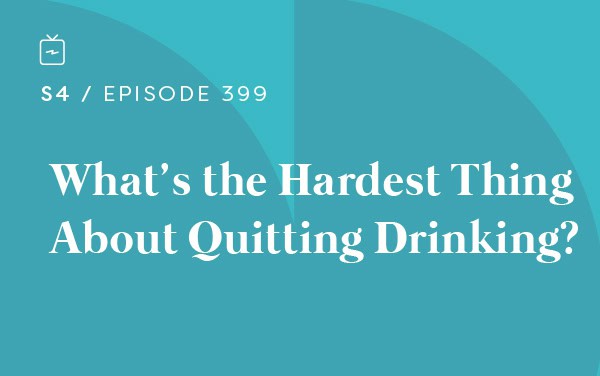
by Kris Oyen | Oct 10, 2022 | Podcast
Podcast: Play in new window | Download
Subscribe to the Recovery Elevator Podcast Apple Podcasts | | More
Episode 399 – What’s the hardest part about quitting drinking?
Today we have Zita. She is 31, from Minnesota, and took her last drink on November 27, 2021.
Restore: https://www.recoveryelevator.com/restore/
Highlights from Paul
An AF life is overall better than drinking. The key word is overall. Quitting drinking is the hardest thing Paul has ever done, and, it’s the best decision he’s ever made.
Not quitting is harder on you than you realize. The domino effect of addiction cascades to your health, your relationships, your livelihood, and your sense of well-being. Those rock bottoms get worse and hit new depths that create despair, shame and helplessness. The decision to quit drinking can be harder when you don’t have those rock bottom moments, but you still have that voice in your head telling you, it’s time. Quitting isn’t easy, particularly in the beginning, but it has its own set of dominos, the path toward a better life.
The hardest part about quitting drinking isn’t the withdrawals or burning the ships. It’s entering the path of the unknown: infinite possibilities exist.
You can put the shovel down at any time.
Better Help: www.betterhelp.com/elevator – 10% off your first month. #sponsored
[12:26] Zita is an ICU nurse. She loves cooking, travel, rollerblading, movies, and getting her nails done. She is headed back to school to become a nurse practitioner.
Zita’s relationship with alcohol started in her early teens. She was a normal drinker through college. She drank a lot, but it never impacted her school, her relationships, or her ability to function. After college, she started working and a few years in she noticed having anxiety when she was around people which was a shift. After a breakup, she started using alcohol to cope with her emotions.
Zita’s family members spoke with her about her drinking, intervention style. She thought about slowing down but quitting never occurred to her at that point. Upon continued reflection, Zita realized she had some unprocessed trauma. She tried naltrexone, Antabuse and Women for Sobriety. Nothing was working. She shifted her approach to working on mental health and took a month off work and started DBT (dialectical behavioral therapy) treatment. Mental health support gave her new tools to shift her mindset. The first few months were hard and she nearly relapsed, but she gained some momentum.
Today, Zita feels great. She has gained assertiveness, confidence and learned to develop boundaries. She doesn’t have her “old self” back, she has a better life. Zita is proud that she has learned to manage her emotions more effectively. Looking forward, Zita is excited about graduating. She focused her education on mental health, and she looks forward to making broader contributions with her new knowledge.
Paul’s Summary
Paul believes you are about to bloom. Nobody exists without a purpose in the universe. Things under pressure produce new results; rocks under pressure become diamonds. The blooming has already begun.
[47:21] Musical submission from The Aquerials.
Upcoming events, retreats, and courses:
- You can find more information about our events
Resources
Connect with Cafe RE – Use the promo code OPPORTUNITY to waive the set-up fee.
Recovery Elevator YouTube – Subscribe here!
Sobriety Tracker iTunes
Recovery Elevator-
We are the only ones who can do this, but you don’t have to do it alone.
I love you guys.


![]()
![]() Level 2: Someone you consider a friend, or who you have regular monthly interaction with. This is an acquaintance from the gym, a neighbor, restaurant employee.
Level 2: Someone you consider a friend, or who you have regular monthly interaction with. This is an acquaintance from the gym, a neighbor, restaurant employee. ![]() Level 3: This is someone you interact with on a weekly basis. Co-worker, good friend, running partner, or hiking friend.
Level 3: This is someone you interact with on a weekly basis. Co-worker, good friend, running partner, or hiking friend.![]() Level 4: Meeting with a close group of friends, family, spouse, in person conversation. Immediate family.
Level 4: Meeting with a close group of friends, family, spouse, in person conversation. Immediate family.![]() Level 5: FB Live, Podcast, Social media post, family meeting, airplane with banner in the sky.
Level 5: FB Live, Podcast, Social media post, family meeting, airplane with banner in the sky.





